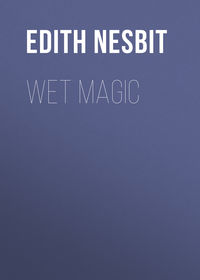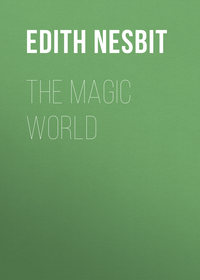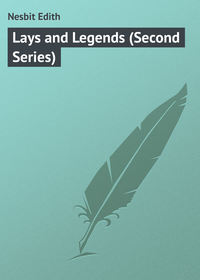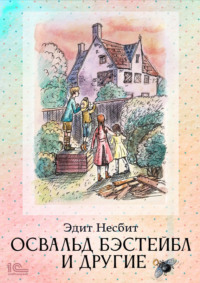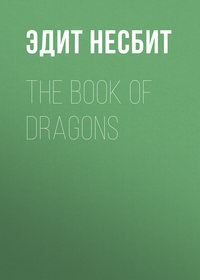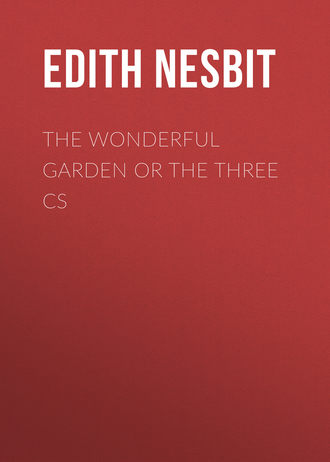 полная версия
полная версияThe Wonderful Garden or The Three Cs
The large table was covered with loose pink rose leaves. That was Caroline’s idea. ‘Yes,’ she said, ‘I know what it will remind them of. But reminding doesn’t matter when all’s forgotten and forgiven, and look how soft and fluffy they look, like pink fur.’
This also reminded one of things. But no one said anything, though every one tried so hard not to look at the leopard skin that they might just as well have been staring at it.
‘How pretty the flowers look, reflected in the looking-glasses,’ said Caroline tactfully; and Charlotte, with less tact but equal goodwill, moved an embroidered stool between Rupert and the leopard’s spotted hide.
Tea was a meal of masked excitement, of gigglings scarcely suppressed by the children, and of a careful air of there being nothing particular in the wind on the part of Uncle Charles and Mr. Penfold. When the last cup had been emptied, the last piece of cake reduced to crumbs and memory, Charles was at last allowed to say the words which had been arranged for him to say, and which, all through the meal, he had been bursting to repeat.
‘Please, uncle, there is a meeting of the Society of the Secret Rose in the drawing-room, and the Rosicurians have got a present for you’ – ‘a presentation,’ corrected Charlotte – ‘a presentation, and will you please come and be presented.’
‘It’s all wrong,’ said Charlotte, who had composed the speech for him and had the natural vanity of an author. But every one was getting out of their chairs, and in the noise they made, nobody heard her.
The drawing-room certainly looked, as Harriet had said when she peeped into it before tea, ‘a fair treat’ – with its white-spread floor; its vases and jugs and jars of roses; its rose-leaf-covered table, edged with the twelve symbolic flowers in jam-pots, white and elegantly small; and all the splendour of afternoon sunshine real and reflected. The Uncle looked at the room over his glasses, just as though he had never seen it before.
‘Beautiful,’ he said; ‘very beautiful.’
Charlotte took him by the hand and said:
‘Dear uncle, this time we make you a presentation, and it’s not to get anything out of you. But just to show what we think of you. Caroline will read you what we’ve written, like addresses to mayors, you know. We hadn’t time to illuminate it to-day, but we will afterwards, if you like. And when she has read it, we will give you the real presentation. It is under the basin in the middle. But you mustn’t look at it till we say – ’
She stopped. The others looked at her meaningly.
‘I can’t help it,’ she said, flushing. ‘I’ve forgotten the words. Uncle saying “Beautiful” put it out of my head. But it means the same as the words I settled to say, and Charles didn’t remember his either.’
‘Your address was exactly what all addresses should be,’ said the Uncle – ‘short and to the point. I pledge my honour to respect the secret of the basin until I am permitted to approach it.’
The basin was a great bowl of blue and white china that, reversed, occupied the middle of the table. On it lay a full-blown rose and two buds.
Caroline unfolded a large sheet of paper of the size called demy and the kind which is used to bake cakes on, line boxes with, and drain fried fish on. Caroline had begged it from the cook, and there was a good deal of violet ink on it.
‘Hem!’ said Caroline, turning the large pages. ‘Oh yes, it begins here.’
‘To the noblest of known Uncles, Charlotte, Charles, and Caroline present their compliments and thanks. We have culled in your wonderful garden the blossoms we think express all the things we want to say. These dainty floral pets’ (can you tell which part of this address came out of the Language of Flowers, and which was Caroline’s own invention?) – ‘these dainty floral pets represent the most delicate and appropriate sentiments, and, offered to the beloved object, cannot fail to convey the deepest secrets of the enamoured heart. All our hearts are yours, dear uncle, because you are such a brick. The flowers are’ – she pointed to the first pot on the left – ‘branch of currants. It means “you please us all.” Because you do. Next pot – yellow acacia. We only got leaves, because it flowers a different time, but it means “secret love.” Our uncle is in a secret society with us and we love him being in it.
‘“Clematis indicates that beauty of the mind without which the fairest bodily endowments are but fleeting shows.” Uncle is clever, so we got clematis. And white pinks mean “talent,” so we got them. Sorrel we got, partly because it means affection, and partly because it is pretty and there is lots of it. And plane-tree looks dull, but in reality “it indicates to the discerning recipient that the giver considers himself privileged to offer the tribute of its agreeable foliage to the hands of Genius.” That means the Uncle, because he writes books. Pythagoras says a lot about plane-trees. “Laurel needs no words to inform the reader of its meaning. It is too well known as the ornament of the foreheads of the great. It also signifies success,” and we hope your book will be a great success. Red clover means industry, because uncle works so hard every day and not to be disturbed on any pretence. And “nightshade whose dark leaves and mysterious purple blossoms denote witchcraft and magic.” We have mixed roses with that, because they mean love, and uncle loves witchcraft. So do we. And so we have put the double daisy. “This innocent little flower in its double state has, humble as it is, a deep meaning to the student of the language of our floral darlings. It signifies ‘I share your sentiments,’” so we put it last, because we share uncle’s about magic and things, and we hope he will share ours about the presentation when he sees it. That’s all,’ said Caroline, very much out of breath.
‘Hear, hear!’ said Mr. Penfold; and the Uncle said:
‘Thank you; thank you very much. The most learned and delightful address I have ever listened to. And the flowers are beautiful in themselves as well as in their symbolism.’
‘We’re so glad you like it,’ said Charles, ‘but wait till you see the presentation. He may look now, mayn’t he, Caro?’
‘Lift up the basin,’ said Charlotte; ‘be careful not to drop it, uncle, it’s awfully heavy.’
Uncle Charles raised the great bowl in his hands and set it down among the rose leaves. Under it was a white cloth covering something and on the cloth another red rose, full blown, and two buds.
‘This is the real inside heart of the presentation,’ said Caroline. ‘Don’t look for a minute. We found them inside Pope’s Iliad and Thessalonians. And we are almost sure they are. And we hope you’ll be pleased.’
‘I can hardly believe that I could be more pleased than I am already,’ said the grateful uncle, and with that he lifted the white cloth (one of Caroline’s best handkerchiefs) and laid bare the books.
There was a breathless silence. The Uncle lifted the books and looked at them.
‘You know,’ he said presently in almost a broken voice, ‘I believe they are. I am almost sure they are.’ Then he said nothing for a minute and then, ‘Thank you,’ he said; ‘thank you,’ and opened the book again. ‘It’ll make all the difference,’ he said to Mr. Penfold; ‘absolutely all the difference.’
‘We found them,’ Charles was beginning, when Mr. Penfold made him a sign to be silent, and made another sign towards the door. Then he led the way from the room. The children followed, and when they were all out he closed the door softly.
‘When people are very happy or very unhappy, they like to be left alone. I think that just now your uncle is very happy.’
‘How glorious!’ said Caroline.
‘So am I,’ said Mr. Penfold. ‘An angel in human form, called Mr. James Hodgkinson, has sent me five pounds towards restoring the church. I have blued the lot on tiles for the roof of the porch. If you like to come down you can help put them on. Like to?’
‘Rather!’ was the enthusiastic answer of the three C.’s.
Rupert did not answer. And when they looked round to see why he did not answer, they saw that it was because he was not there.
CHAPTER XX
THE WAXEN MAN
‘You know what Rupert was saying that day,’ said Charles one day when Rupert as usual was down at Mr. Penfold’s, ‘about doing something real with our magic?’
‘Like making her come alive,’ said Charlotte, looking up at the picture of Dame Eleanour.
‘No, like making wax images of people and sticking pins in them. I should like to do that. I feel as if the Language Of was bust up, somehow.’
‘Oh, don’t say that,’ said Caroline, pained.
‘Well, not for always, perhaps,’ said Charles kindly; ‘but we did give the Uncle such a tremendous blow-out for his presentation, and we did the leopard, and we sowed the F. of H.D., and anything else seems rather piffling after that. I wish we could make a wax image of some one.’
‘Not to stick pins in,’ said Caroline firmly. ‘That would be ink-black magic, I’m certain. And very very wrong and unkind besides.’
‘No pins, I don’t mean,’ said Charles, ‘but just make one. We could decide what to stick into it after we’d made it.’
‘Caro and I wouldn’t agree to sticking anything into it,’ said Charlotte; ‘and, anyhow, you haven’t got any wax.’
‘Yes, I have,’ said Charles triumphantly; ‘so there! I’ve been saving it up ever since he said that.’
‘Where from?’ asked the girls together.
‘The sticking-out bits of candles,’ said Charles, ‘and one or two ends out of candlesticks in the morning when they are put on the boot-shelf in the scullery to be cleaned. It’s a good big lump now. Shall I get it?’
‘It would be fun to model something,’ Caroline admitted, and Charles, falling flat on his front, felt behind the big books on the bottom shelf and produced a large ball of a grey semi-transparent nature.
‘Here it is,’ he said. ‘Now I’ll tell you what I’ve thought. Only don’t tell Rupert. We’ll do it first and tell Rupert afterwards. And then he’ll have to believe.’
‘Well, what is it?’
‘We’ll make,’ said Charles slowly and seriously, ‘a wax image of the Murdstone man, and we’ll make him hollow, his legs and arms needn’t be, nor his head, but just his chest. And make his heart separate, and put it in. And take out his heart and melt it every day. That would soften his heart, and he would say he was sorry and Rupert would forgive him.’
‘“When hollow hearts shall wear a mask,”’ said Charlotte.
‘That’s only song-nonsense. People die if you take their hearts out,’ said Caroline with conviction.
‘Well, then, don’t let’s make him hollow. Let’s make him solid and then think what to do.’
‘I know,’ said Charlotte; ‘but if he’s a pig, he’s a pig, however solid you make him. What’s bred in the bone will come out in the wash. And if we’re not to stick pins in him, what’s the good?’
‘Oh,’ said Caroline, ‘I think I know. Look here! We’ll make the wax image and then be kind to it. You can tame wild beasts with kindness.’
‘It kills cats,’ said Charlotte.
‘No, it was Care killed the cat,’ Caroline reminded her, ‘and, anyway, this won’t be a cat, even if it did. We’ll think of nice things to do to it. Let’s make it now.’
‘Bags I!’ said Charles hastily. ‘It was my idea, and I collected the wax.’
‘Like an old bee,’ said Charlotte. ‘All right, fire ahead.’
Charles had been warming the wax between his hands, and now, hardly waiting for Caroline to fetch and spread a newspaper, he began to divide the wax into six pieces.
‘One head, two arms, two legs, one body,’ he explained.
The girls watched with breathless interest. Charles rolled the smallest piece of wax round in his hands till it was like a marble, and the biggest piece till it was like a fives ball; the remaining four he rolled lengthwise till they were like thick tobacco-pipes. Then he stuck the four pipey bits and the round marble on to the fives ball and held the whole thing out triumphantly.
‘I think it’s awfully like,’ he said, ‘especially the right arm that he hit Rupert with. I should like to stick just one pin in that.’
‘You mustn’t,’ said Caroline. ‘Yes, it’s awfully nice, but it hasn’t any clothes. I know statues of Greek heroes don’t have any clothes. But he’s not a Greek hero. And nowadays people have to have clothes even in their statues. Look at Mr. Gladstone. And it would be more like real if it had a nose and ears, wouldn’t it?’
‘I say,’ said Charlotte, ‘let’s get bits of bent twigs and pretend they’re him, and then make wax clothes. Do let us help, Charles. It does look so interesting to do. You shall do the first kind thing for him if you’ll let us help make him.’
‘I think he’s all right,’ said Charles, looking at the blobby thing he had made, which was more like an imperfect octopus than a man; ‘but if you promise me to do the first thing, I don’t mind.’
‘Right O! I’ll get the sticks.’
When the sticks had been found, the three children began to model parts of the Murdstone man, but Caroline and Charles soon stopped and were content to watch Charlotte. She really seemed to know what she was about, which the others felt could not be said of them. She chose suitable twigs, fastened them together with bits of wax, and then began to clothe them with wax. She produced an arrangement not at all unlike a jacket and waistcoat. The trousers were a failure. The most accomplished sculptors have admitted that trousers are difficult to treat artistically. But they remembered that, last time they had seen him, the Murdstone man had worn knickerbockers, and in these, revealing the shape of the stockinged human leg, Charlotte was considered to have surpassed herself. The head was very difficult, but even this was managed, the hair question being settled by a large flat cap with a peak. The new model had a nose and mouth, ears large, but still ears, and hands each with four fingers and a thumb. And when Charlotte rolled up the tiniest bits of wax, flattened them and stuck them on the coat and waistcoat for buttons, Caroline shouted, ‘Bravo! You’re as good as Praxi – what’s-his-name!’ and even Charles said it wasn’t half bad.
‘Now,’ said Charlotte, ‘the first nice thing to do for him is to put him in a bed of rose leaves. That’s what they say when they mean a life without a sorrow or care.’
‘And then burn incense. We can make the incense out of the proper flowers,’ Caroline said.
‘Rose leaves are dull,’ Charles said, ‘and perhaps the Murdstone man doesn’t like incense.’
‘The real one mayn’t. This one’s got to like what we want it to like,’ said Charlotte. ‘We made him and we know what he’s got to like.’
‘Then we might make it so that he’d like having pins stuck into him,’ Charles suggested hopefully.
‘We might; only we shouldn’t be so silly. Come on, bring the Language Of and the Murdstone man. I’ll get a box and Caro can get the rose leaves. We’ll go out and find a secret place in the wood.’
A cardboard box that had held Charlotte’s best shoes was filled with sweet pink petals and the waxen image put in it. It looked better standing up, but you don’t stand up in a bed, even of rose leaves. A sort of pedestal was built of old bricks brought with some toil from the ruins of the deserted lodge’s pig-stye. A flat stone, which took all three to lift, was placed on top. And on this the box. But the box, which said ‘Smarm and Simple’s Hygienic Footwear’ in blue letters outside, troubled the girls because it was ugly, and Charles because it was untruthful.
‘Whatever he is, he isn’t footwear,’ said Charles. ‘We could make it true by trampling on him, but you won’t agree to that.’
‘No,’ said Caroline, ‘but look here. Let’s paste a bit of my green sash on it, and then put moss round. That’ll make it more woodland-like.’
Cook provided the paste, and Caroline cut the sash. She paste-wetted the first piece of silk so that it came out in wet spots, very messy looking, as Charles did not fail to point out.
‘Never mind,’ said Caroline, ‘I’ll cut another bit – it’s much too long – and use less paste.’
‘More paste less speed,’ said Charlotte. ‘I’ll cut mine. Then they’ll be alike, just as they were before.’
This time the box certainly looked very rich, and the moss round it looked very fresh and beautiful.
A smaller pile of bricks supported the lid of a cocoa-tin for incense.
The Language of Flowers, hurriedly consulted, informed them that jasmine stood for amiability, St. John’s wort for animosity, Indian pink for aversion, the pimpernel for change, sage for esteem, and the hazel for reconciliation. Further, that the tamarisk stood for crime and the potato for benevolence.
All these were found in the Wonderful Garden except the potato, and none of the children knew what a potato looks like when it is growing, and they did not like to ask any one, for fear they in turn should be asked what they wanted it for.
‘Never mind,’ said Charles, ‘we can save one from dinner. I don’t suppose it will matter its being cooked.’
That the potatoes that day should happen to be mashed, seemed to all a mishap yet not a calamity. A quantity, deemed sufficient to influence Mr. Murdstone through his waxen image, was secreted in the envelope of a letter from Aunt Emmeline, and not more than an eighth of the potato escaped into Charles’s pocket through the square hole where the Italian stamp had been cut out for his collection.
‘We’ll arrange the things we want him to be round the box,’ said Caroline, ‘and the things we want him not to be we’ll burn and call it incense.’
Charles owned that he had been wondering what sort of incense you could make out of mashed potato.
Jasmine, with its white stars, bright Indian pinks, gay tufts of sage, and the oval-ringed leaves of the hazel, arranged round the box, made a charming tangle. ‘The silk wasn’t wanted, really,’ said Charles. ‘The hygienic boots would never have shown through the flowers.’ But the girls agreed that it was nice to know it was there.
The mashed potato and the rather faded pimpernel were carefully concealed under the more attractive offerings.
‘It looks fine,’ Charles said, and what he said they all thought.
It is very hard to make small pieces of green things burn in a cocoa-tin lid in the open air by means of a box of matches, and the fragments of a potato-dampened envelope from an aunt in Italy. Nothing much happened except smoke, and the head of a match burnt Charles’s finger.
‘There’s no more paper,’ said he, ‘except the bit we’ve written his name on.’
‘There’s the match-box,’ said Caroline; ‘let’s make a little bonfire with twigs and then put the incense things on when it’s burnt up.’ This they did; and the starry gold of St. John’s wort, the gay brightness of Indian pinks, and the feathery greenness of the tamarisks twisted and writhed amid flames and smoke.
‘Now we’ll leave it. Please, Murdstone man, let your crimes and your animosity and your aversion be burnt away, and may you lie on beds of roses really as soon as you are changed and amiable. Then when you are truly benevolent, Rupert and us will esteem you, and the hazel is for reconciliation. Now let’s go away and leave the incense to do its healing work, and to-morrow we’ll come and put a fresh rose-bed and burn new incense.’ Thus Caroline. The others agreed, and after having put on the box the label with the Murdstone man’s name, so that Destiny could not pretend to make any mistake as to who the witchcraft was meant for, they went away through green coverts, in Indian file, to build a wigwam in another part of the wood with three hop poles, three red blankets, and their three mackintoshes.
‘I hope Rupert won’t ask a lot of questions about what we’ve been doing to-day,’ said Charles. But Rupert did not ask any. He came home singularly silent, and went to bed early, announcing that he was going to spend the following day, also, with Mr. Penfold.
‘So we needn’t tell him,’ said Charlotte, ‘till the good work is done. I’m glad of that.’
Next day, with a fresh armful of suitable flowers and some more potatoes, fried this time and bearing heavy traces of their close intimacy with the breakfast bacon, the children sought the secret spot where they had laid the waxen image of Mr. Murdstone on its bed of roses. The ashes of the incense bonfire were there, the pedestal was there, the green-covered box was there, half filled with half-faded rose leaves; but the waxen image was gone!
‘He must have fetched it away himself,’ said Charlotte, breaking an awe-struck pause; ‘he must have felt what we were doing and made up his mind to be benevolent. And he fetched it away so that we shouldn’t waste any more good potatoes on him.’
‘I wish he’d do something to show that he’s changed into a Real Good and what sort of Good he’s changed into,’ said Charles. And it certainly is tiresome to work magic and then not to know exactly how it has acted. That their magic had acted, the children were of course quite certain. They had done magic too many times, as you know, to entertain a moment’s doubt as to whether their spells were going to work or not. And the fact that the spell they had worked was not worked exactly as the book said, did not trouble them. For, as Caroline said, ‘If you can do harm to wax people, you can do good to them. More really, I should think. Because one’s wrong and the other’s right.’
But it was a rather disappointed party that took its way through the greenwood, leaving the secret spot with its trampled flowers and scattered ashes. They came across their wigwam and spent the rest of the morning there, and, when the dinner-bell rang, loaded themselves with the mackintoshes and blankets which had been forgotten yesterday.
As they trailed out of the wood into the drive, Charles, who was first, dropped his blanket and stopped short, blocking the view of the others, who were following him down the narrow path.
‘What is it? what is it?’ they asked.
‘Shish!’ said Charles and backed into the hazel bushes, and the girls pressed forward to see what there was to shish about. Then they in turn backed into the green covert, and the bushes closed over them as they stood there holding their breath as footsteps went by them along the drive. When the footsteps had passed far enough away for the children to dare to move, they backed with one consent into the wood, not stopping till they came to an open glade where they could comfortably look at each other and exclaim, ‘Well!’ They were past all other words. For what they had seen was Rupert coming up the drive, looking pale but not unhappy. And beside him, with his hand on Rupert’s shoulder, and talking to him in the friendliest way, was – the Murdstone man!
‘Rupert will have to believe now!’ was the first thing any one found breath to say. It was Caroline who said it. The others still had not breath enough for more than ‘Rather!’
CHAPTER XXI
THE ATONEMENT OF RUPERT
‘I do wonder what has happened,’ Charlotte whispered. ‘I suppose the Murdstone man was coming to tell Rupert he had been spell-changed into being nice now. And he must have met Rupert on the way.’
‘But he could have said that in the road and then gone home. There must be some reason for his coming home with Rupert. He can’t,’ said Charles hopefully, ‘be going to tell us that he’s changed? That would be ripping.’
‘I expect he’s telling the Uncle,’ said Caroline. ‘When the wicked Magician takes off his spell and the wicked Prince turns good, he always tells everybody at once.’
‘Then he’ll come and tell us,’ said Charles. ‘We’re part of everybody, the same as grown-up people are.’
The three C.’s had come slowly back to the house, and, seeing no sign of Rupert and the changed Murdstone man, had, with great tact, chiefly Caroline’s, refrained from going in search of Rupert or of information.
They had just shut themselves into the dining-room, and waited. For it was quite plain that something more must happen. The once-hated Murdstone man could not just come to the house and go away again and the matter end there. But waiting is tiresome work, however proud you may be feeling of your tact and delicacy, and you are so interested and anxious that it is idle even to pretend to read. The three C.’s were very glad indeed when at last they heard footsteps in the hall, and voices.
‘Now!’ said Caroline. ‘Now they’re coming. We’ll be most awfully nice to him, won’t we. Now he’s sorry and he’s owned up.’


